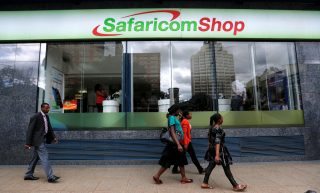Kenya’s biggest telecoms operator, Safaricom, has stated that it has no plan to slash its call rates in a bid to forestall another price war barely a week after Bharti Airtel Kenya announced a 50 percent reduction on it call rates.
Bob Collymore, Safaricom Chief Executive officer told Reuters that the decision by its fierce competitor might ignite a ‘price war’ among leading telecommunication companies in the country.
“We are not going to move our prices. If we lose market share as a result of that then that is fine. We have to maintain a sustainable business.” he said in Nairobi, Kenya’s capital.
Bharti Airtel cut its call rates to all other networks to 2 shillings ($0.02) a minute while Safaricom will still charge 4 shillings a minute.
The 50 percent tariff reduction signals an imminent battle between rivals Safaricom and Bharti Airtel in the country as mobile telecom provider struggle to hold on to their existing customers. “We endeavor to keep giving our customers the very best products and services that will positively impact their lives,” said Prasanta Das Sarma, Airtel Kenya CEO while announcing the new rates last week.
The disparity in the tariffs has raised questions over continuous dominance of Safaricom in the Kenya telecommunication industry. Safaricom CEO, Bob Collymore, who just return to the company after battling an undisclosed ailment said the telco giants dominance shouldn’t be rivals, claiming it as a result of customers choice. However, in what seems to be a retaliatory action, Safaricom has hinted on new tariff reduction on its Lipa Na M-PESA. According to reports, the company CEO said it will implement a 50% tariff reduction for all Lipa Na M-PESA Buy Goods merchant fees.
Kenya’s mobile telecommunication market is booming, recording extraordinary success in recent years, it currently has about 41 million mobile subscribers, a number that indicates an increase from previous years. In Kenya, mobile penetration stays at an estimated 80 percent with three mobile service providers Safaricom, Bharti Airtel and Telkom Kenya in scuffles to gain more customers.
This ‘competition’ has lingered for a while with competitors making every effort to break Safaricom’s hegemony in the market. The competition reached its peak in 2017 when a proposal to break Safaricom and M Pesa (its mobile money platform) was formally initiated. Over time, Safaricom has witnessed great success by riding on the coat-tails of its popular mobile money platform M Pesa to beat off competition from rivals in the country.
In October 2010, Safaricom was forced to reduce it call tariff after competitors Bharti Airtel (formerly Zain) first announce price slash. The ‘price war’ which started in 2010 continued in 2013 when Airtel reduced its call rates across all network to Sh2 in an attempt to woo more customers, while also triggering another round of price wars among telecommunication giants in Kenya. As the price war continues, what remains unclear is how best competitors can eclipse the influence of Safaricom in Kenya.








